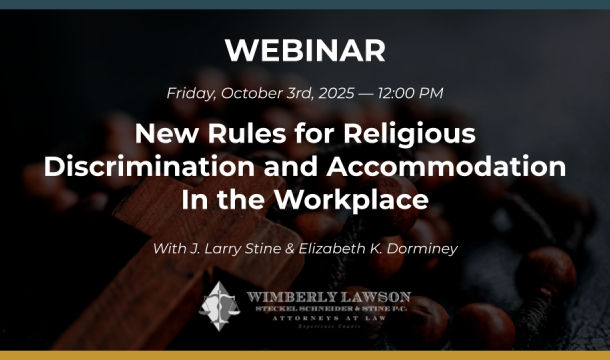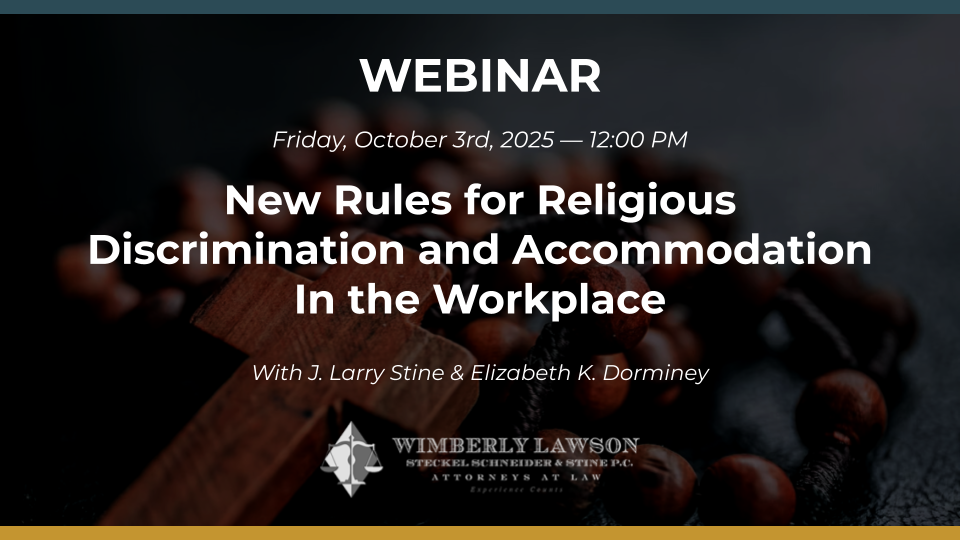Do Employees of Private Employers Have Any “Free Speech” Rights?
Last week, we addressed how an employer can deal with an employee who poses with Nazi imagery. We noted that the First Amendment does not protect the speech of employees of private (non-government) employers from adverse action by that employer. Do employees of private employers have any "free speech" rights? The answer is Yes.
There are two main categories of protection of employee speech under federal laws. [State laws may offer additional protections, so we advise that employers also check the state laws applicable to their workforce.]
- Section 7 Rights under the National Labor Relations Act.
Although many people associate the National Labor Relations Act (NLRA) with union elections, in fact, its reach extends far beyond those matters. Section 7 of the NLRA generally protects employee speech about the "terms and conditions of employment" from adverse action by the employer. "Terms and conditions of employment" encompasses a lot of things, including complaints about wages, hours, working conditions, unfair discipline, and dirty restrooms. However, it does not encompass false or malicious speech about a company or its products. In other words, Section 7 may protect an employee who posts on social media that "I have seen dogs treated better than the employees of this company," but it may not protect an employee who posts that "The company uses dog meat in their products," when the latter statement is untrue.
An aggrieved employee can file an unfair labor practice (ULP) charge with the National Labor Relations Board, which will investigate and process the charge. In fact, James Damore, the engineer fired by Google for writing the 10-page memo about women in tech jobs, filed a ULP charge.
2. Anti-retaliation/Whistleblower Laws
This is broad category of protections provided by various federal antidiscrimination laws, such as Title VII, FLSA, ADEA, and the ADA; laws targeted to health and safety, such as OSHA; and laws governing the disclosure of certain financial information, such as Sarbanes-Oxley. Basically, these laws protect employees who make good faith complaints about discrimination in the workplace (either directed at them or others), safety issues, or financial reporting discrepancies, from retaliation by their employers. As we have discussed in the past, some employees try to use these statutes as a sword rather than a shield to try to protect themselves from an adverse employment action, such as termination, that they knew was coming. This is one reason why documentation of employment decisions can be crucial to establish a timeline to show that an employment decision was made before the employee made a complaint.
Pro tip: If an employer desires to take action against an employee for a social media post or other form of speech, it is important to first establish that the speech does not fall under any protected categories. Those categories exist under both federal and state laws, so it is advisable to consult with experienced employment counsel before taking action.

Kathleen J. Jennings is a former principal in the Atlanta office of Wimberly, Lawson, Steckel, Schneider, & Stine, P.C. She defends employers in employment matters, such as sexual harassment, discrimination, Wage and Hour, OSHA, restrictive covenants, and other employment litigation and provides training and counseling to employers in employment matters.
Related Content
Get Email Updates
Recent Content

Trump Nominates Appointments to NLRB and EEOC but Policy Changes Likely to Be Delayed

DOL Launches Self-Audit Programs Designed to Help Employers Improve Compliance

DOL Must Release EEO-1 Reports to the Public under Open Records Laws

Current Advice on Active-Shooter Situations

New Policy for Federal Workers and Religious Expressions

